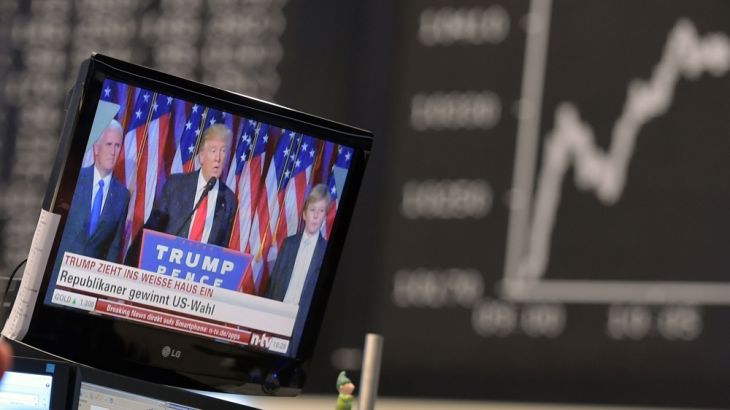
‘Trumponomics’: Putting America first
A special focus on Donald Trump’s economic policy and what his presidency means for the US and the global economy.
Donald Trump, the man who promised “Brexit times ten”, is now set to control the world’s biggest economy come January – that’s about a third of the world’s GDP.
Hundreds of economists warned against a Trump presidency, claiming that his anti-trade and anti-immigration stances would do anything but promote growth. The World Trade Organisation (WTO) agreed, saying that protectionist measures would hurt the world’s poorest the most.
Keep reading
list of 4 itemsChina’s economy beats expectations, growing 5.3 percent in first quarter
Inside the pressures facing Quebec’s billion-dollar maple syrup industry
Manipur’s BJP CM inflamed conflict: Assam Rifles report on India violence
Trump plans to “put America first” and rejects globalisation. That pledge got him elected in the biggest shock to the political and financial system since Brexit.
Trump favours protectionism, suggesting a 45 percent tariff on products from China. He rejects the notion of free trade, with plans to renegotiate existing deals, such as the North America Free Trade Agreement (NAFTA). The deal is a trilateral trade bloc, allowing for free trade and the due creation of jobs and opportunities between the United States, Mexico and Canada. Trump has even threatened to pull out of the WTO.
”You
probably waiting to see what Donald Trump looks like, how does he govern as president.”]
A fiscal stimulus, ie, tax cuts across the US bringing down business tax from the current 35 percent to 15 percent, is also on the cards, alongside the elimination of Wall Street regulation, including the removal of Dodd Frank Wall Street reform – the anti-bank bailout regulation put into place after the 2008-2009 financial crisis.
Trump inherits the world’s largest national debt in the shape of the US treasury bond market. It is now worth around $20 trillion and will continue to increase if he cuts taxes and starts a big spending spree. That debt is largely owned by the rest of the world.
So how could America’s role in the world economy change? What will the US under Trump mean for oil-reliant economies in the Middle East? And how will his economic policies affect the emerging African economies?
China and the United States
Frances Donald, a senior economist with Boston-based Manulife Assets Management, is seemingly positive, but wary, with the US dollar strengthening after the election results and a market predicting growth based on a Republican senate sweep.
“Markets are focusing on this GOP platform, which says look, we’re probably going to see lower taxes, maybe a cut to the corporate tax rate, we may see less regulation … more government spending. That’s, ultimately, positive for growth,” says Donald.
On China and tariffs for imported goods, Donald says: “What we’re expecting … from China in particular … their central bank, their government, will become a little more cautious, will maybe want to provide a little more insurance to the economy in case we move towards protectionism trade rhetoric.”
Impact on the European Union
With key elections coming up in Germany and France, the focus turns to the effect a Trump presidency could have on the European Union. Marine Le Pen of France’s National Front is the European Union’s main threat to instability, and has now been strengthened by Trump’s win.
Jean-Claude Juncker, head of the European Commission, has called for an emergency meeting with Trump in order to clarify time-sensitive subjects, such as the situation in Ukraine and the conflict in the Baltic states and Trump’s seemingly ‘cosy’ relationship with Russia. Clarity is much-needed, with European states confused as to what will become of their relationship with their longest-standing ally over the Atlantic.
Mexico: Trump’s border policies
Latin America’s second biggest economy is also bracing for a new reality on its borders. The Mexican peso saw its biggest fall versus the dollar since the 1994 Tequila Crisis all on fears of what Trump may do.
The president-elect is placed to deport all undocumented migrants, build a bigger wall on the border between the two countries and is formulating a plan to crack down on the amount of money Mexican migrants send their families back home.
“The United States, in many ways, depends on Mexican trade, as well as Mexico depends on US trade, so it’s going to be interesting to see if someone tries to tell [Donald Trump] that even though these were the ideas and proposals by which he was elected … this could have an enormous negative impact on the United States,” says Maria Ana Salazar, former State Department employee.
Trump and the Middle East
What will the US under Trump mean for oil-reliant economies in the Middle East? Will Trump attempt to slap sanctions back on Iran? What’s the future of US-Egypt relations? With a crucial OPEC meeting on the horizon what does his energy policy mean for oil and how will power relations within the region shift?
“Oil is important to Donald Trump. If he supports the US shale oil industry, this means we are going to have more supply girth on the market … and we are talking about a market that is already suffering with an enormous share of supply and is waiting for equilibrium,” says Naeem Aslam, chief market analyst at London-based Think Markets.
Africa’s access to US markets
Economists are also looking at the impact of potential US protectionism on emerging markets like Africa. The fear is that access to US markets will dry up.
Africa’s economies are already battling sluggish growth and lower commodity prices are also hurting.
The US spends billions in Africa through aid and investment. But whether that will continue under Trump is very much an unknown. Herman Warren, director for Africa with the Economist Corporate Network, joins Counting the Cost from Johannesburg.